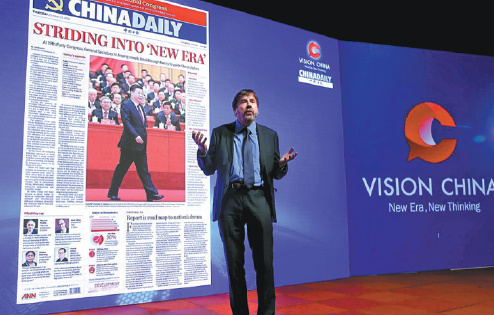

'Eccentric' inspirer
In the eyes of many China Daily colleagues, Moody was a tall, amiable and hard-working colleague who, invariably dressed in a blue shirt, was always hunched over his keyboard writing stories.
Shankar said: "Some would call Andrew eccentric-in the kindest of sense of English eccentricity. He insisted on wearing a jacket through the hot Beijing summers; a tie was always around in case he needed something more formal."
Liu Chengmei, Moody's housekeeper for the past 13 years, said that while he was frugal-the phone and computer he used were both old models-he was a generous employer who paid her much higher than the market price and even helped her look for other part-time jobs.
Teresa Ye, a friend for nine years, said Moody was a creature of habit who followed a simple daily routine.
"For years he would suggest we go to the same Chinese restaurant, sit at the same table and order the same food-shrimp balls with broccoli, dry-fried beans, dumplings and rice, and then he would open a bottle of wine."
He had his shirts tailor-made at a shop in the Sanlitun area of Beijing and kept a diary each day in a Moleskine notebook. At home, classical music was a constant companion, and he was also a keen follower of cricket and soccer.
He was a frequent visitor to art exhibitions and museums, and his Beijing home was full of paintings, sculptures and other artworks he brought back from his travels around the world. He also liked Chinese movies and before coming to China had watched works by directors such as Zhang Yimou.
Before illness took its toll, Moody was a fitness fanatic and long-distance runner who boasted that he could run 10 kilometers in 50 minutes.
Jaspan said his friend "had a dry sense of humor and a neat line in irony. He was never one to make a quick or rash decision.… He liked to question matters and look beyond the immediate or obvious."
Xiao Xiangyi, a colleague who sat next to Moody for almost eight years, said he was always willing to offer a helping hand. "Even when he was super busy he would write down your questions and later provide detailed answers," she said.
Personal kindnesses, such as preparing red envelopes (gifts) for colleagues who were marrying, and returning from overseas trips with candy, contrasted with the irritation Moody could show if he thought someone had spoiled his copy.
Zhong Nan, a China Daily reporter who translated for Moody when he interviewed Chinese businesspeople in Africa, said he could become "very upset" if a single detail was missed in translation.
Senior editor Zhang Xia said editing Moody's stories was educational, given both the new angles and knowledge presented. For a 1,500-word story, Moody would usually interview eight or more top experts in their fields from around the world.
A few paragraphs in a story from one such expert was often the product of a phone conversation lasting up to an hour. Moody also paid a shorthand typist in the UK to do transcripts of interviews to increase work efficiency, though his performance was not evaluated by the number of stories, she said.
On some holidays, Moody would go to countries such as Thailand or Mauritius, but "when he was supposedly relaxing, holidaying and soaking up the sun on a beach, he would be soaking up information he could use in his work", from books on politics and society that he had on his Kindle, said John Nicholson, a friend and senior editor at China Daily.
Senior editor Chen Zhiming said that each time Moody traveled to the UK on holiday, usually around Christmas, he would interview political and business leaders and gather enough material for several stories.
Being financially well-off, Moody was asked more than once: "Why keep working so hard? If I had so many properties like you, I would retire and spend time by the sea." He usually laughed such questions off; he had told friends he had 14 properties in the UK, including one in London.
"He was so devoted to work," his friend Ye said. "He was willing to find his own perspective in the world's second-largest and dynamic economy."